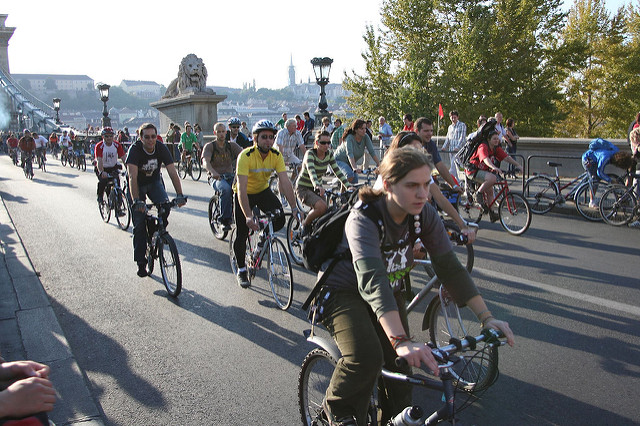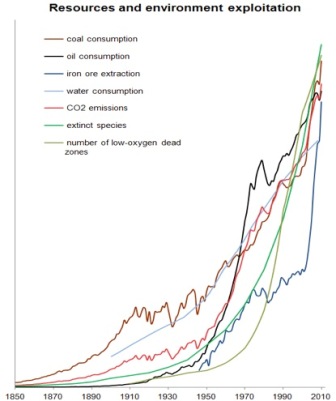By Janna Aljets
At the second planning meeting for the Summer School in February, the organizing team spent some time on discussing the participation of contributors from the Global South – which could involve long-distance flights: How can we ever „authentically“ talk about climate justice without people from the Global South? But also: how can we talk about climate justice on the one hand, and contribute to climate change ourselves on the other – by organizing the Summer School? During the discussion it became evident how difficult and interesting it is to weigh different political principles; which is why we would like to retrace the debate here and make it public.
Globally, the civil aviation industry is growing year after year and puts increasing pressure on the climate and the environment. The CO2 Emissions caused by aviation already make up for 8% of global warming. Apart from the greenhouse-gas CO2, the direct emission of nitrogene oxide into the higher layers of the atmosphere threatens the climate two to five times more than that of CO2. Not to mention aircraft noise which is yet another cause for a multitude of environmental damages. If civil aviation keeps growing at the same pace, its damaging impacts on the climate and the environment will even outpace those of car-traffic within already five years. (Source: BUND, Friends of the Earth Germany).
A calculation example: A round trip flight between Brazil and Germany causes 6 tons of CO2, which is three times more than the climate-compatible annual budget of an individual. The emissions of such a flight from Australia would even be more than 10 tons, which is five times higher than this budget. (Source: atmosfair ) So if our Summer School is to make the case for climate justice, we definitely don´t want to reinforce the climate-impact of civil aviation by inviting contributors from distant parts of the world. But if any at all, isn´t listening to those who contributed least to climate change but are most confronted with its impacts, an ethically justifiable reason for flying?
The concept of climate justice includes the goal to drastically reduce climate-potent greenhouse-gases and fairly distribute the remaining emissions. This also means to particularly consider the unequal distribution of the damages caused by global warming. In the end, those affected most by climate change are usually not only those who contributed the least to causing it, but also the least equipped to facing its damages.
For these reasons we soon realized that we cannot talk about climate justice at the Summer School without including the problems and struggles in the Global South. The perspectives of civil society activists from the Global South need to be considered at the event – not by speaking about them, but by talking with them. Many of us expressed the opinion that restricting ourselves to voices from the Global North would weaken our arguments right from the beginning. And building alliances between social movements around climate justice is also an important goal of the Summer School. Excluding voices from the Global South would make this difficult or even impossible.
So on one hand it soon became clear in the debate that we´d like to admit a huge variety of voices to the summer school to reach out to and understand climate justice from different perspectives. This surely includes people from the Global South and voices from subaltern groups, i.e. people whose causes, due to structural reasons, are largely unheard - which of course can also apply to people from the Global North. On the other hand, the question arose what the activists and experts from the Global South themselves - and the subaltern in the broadest sense - could gain from this invitation. To bring it to the point: Is it justified to fly them in just to speak at an educational event for white and privileged Europeans? How can we organize a summer school that enables us to communicate on equal terms and learn from each other?
In the course of the discussion, concrete proposals to tackle this difficulty were brought forward: Firstly it was recommended to encourage invited contributors to also act as participants and become co-creators of the process. Secondly it was proposed to have as many „other“ voices as possible at the summer school rather than only a few. Thirdly it was suggested to include the topic of climate-forced migration as a key aspect into the programme, as it combines global and ecological justice and allows people without any lobby in Germany or Europe to have their say.
"Working without guarantees is thus becoming aware of the vulneratbilities and blind spots of one´s power and representational systems. It is accepting failure, or put positively, seeing failure as success." (Gayatri Chakravorty Spivak)
Inevitably and luckily, the discussion led us to the question who can speak for whom and what? Who can actually represent a voice from the Global South in a justifiable and meaningful way? And who thereby constructs and reproduces the „other“?
We became aware that, by choosing and inviting contributors from the Global South, we always pick out certain perspectives that are often also represented by privileged groups - who are mostly educated, well-connected and academic. In most cases, they will rarely be perceived as vulnerable or marginalized. The term „Global South“ itself is undifferentiated and unclear and might not protect us from discriminating reproductions, because we as white people are too deeply entangled in racism.
So by the mere claim to be able to decide about the representation of voices from the Global South, we repeat paternalistic white thought patterns. It seems impossible to us to break free from this colonial-racist structure. It is important for us, however, to critically reflect these thought patterns - without benevolently patting ourselves on the shoulders for this great self-reflection. This is why we must and want to keep up this difficult discussion on voice and representation also during the Summer School.
From the multi-layered discussion, a seemingly complex consensus emerged, that hopefully reflects all arguments and concerns from our debate: The Degrowth-Summer School will pay for flight tickets for contributors from the Global South, but only if....
Certainly this agreement doesn´t impose easy conditions on the programme team, and the „yes, but...“ will in many cases lead to a „no“. However, the possibility to nevertheless make use of long-distance flights still permits us to give a platform and a voice to at least a few people from the Global South. For sure, besides speakers from the Global North, we also want to hear and see perspectives from the Global South at the Summer School. ------------------------------
Translation: Christiane Kliemann

It is great to see an attempt to put degrowth ideas into a straightforward form that can be taken into political debate. However, the selection of points is critical and I am not convinced that this is the right selection. I'll just take issue with two: 1. Zero bank-debts “No bank should lend more than its deposits. Banks cannot be allowed to create money out of thin air, while all the ...

The wider degrowth-community is asked to participate in a short survey on sustainable mobility which should not take more than 10-15 minutes: The results will be used as a part of Justin Hyatt´s academic work at the Institute for Housing and Urban Development Studies (IHS), Erasmus University, Rotterdam (Netherlands). It is also intended to publish and widely disseminate a separate report. ...

By Nafeez Ahmed New research suggests that the ongoing global economic crisis is symptomatic of a deeper crisis of industrial civilization’s relationship with nature. The continuation of the crisis, though, does not imply the end of the world – but rather is part of major phase shift to a new form of civilization that could either adapt to post-carbon reality and prosper, or crumble in denial....